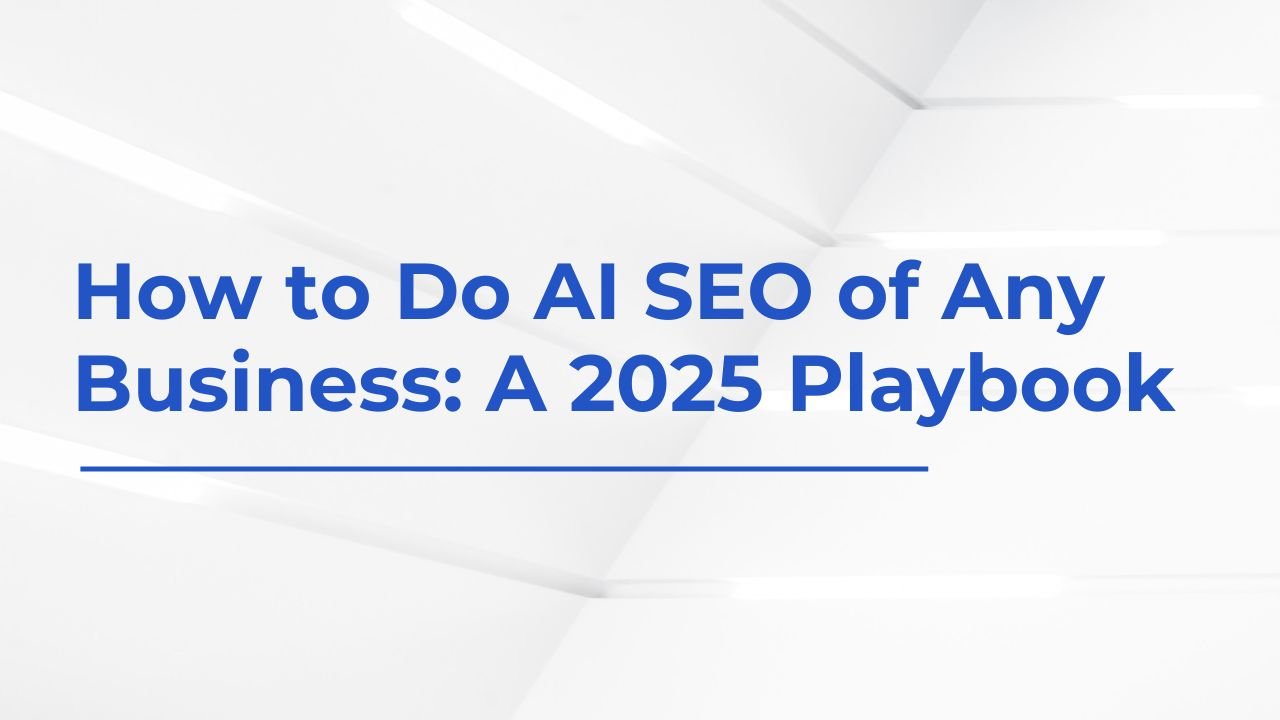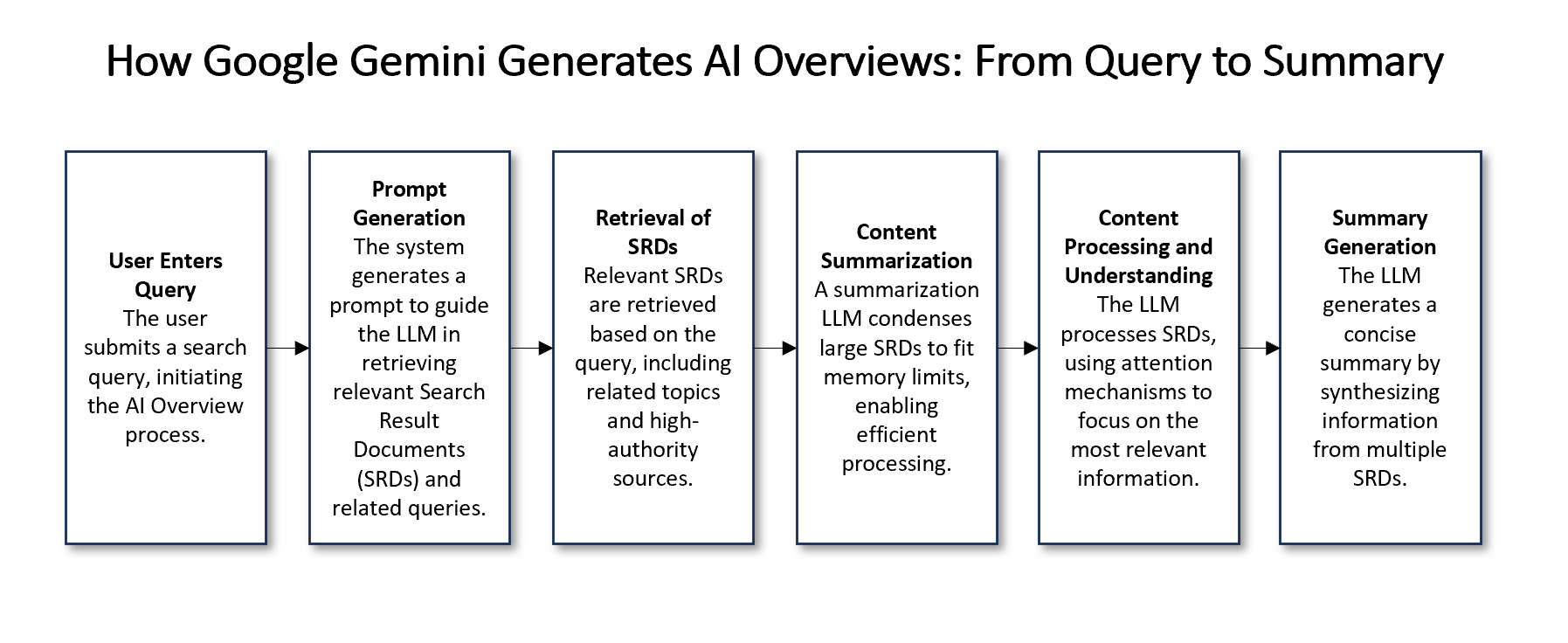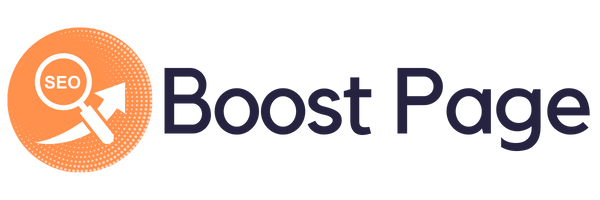
In 2025, Artificial Intelligence (AI) is no longer a fringe trend in search engine optimization (SEO) — it is the backbone of digital visibility for every market sector.
The convergence of machine learning, natural language processing (NLP), generative AI, and real-time analytics has transformed classic SEO into a dynamic, data-driven, and highly adaptive discipline.
If your business is to thrive online, understanding and implementing AI SEO is imperative, not optional. This comprehensive article unpacks the core principles, technologies, myths, tools, pillars, step-by-step workflows, industry applications, and the future of AI-powered SEO, drawing on industry-leading insights and authoritative case studies.
Definition and Importance of AI SEO
AI SEO—Artificial Intelligence Search Engine Optimization—is the integration of AI technologies such as machine learning, NLP, and large language models (LLMs) into SEO workflows and strategies. Rather than relying solely on human intuition, AI SEO introduces real-time data analysis, automated technical checks, content optimization, performance forecasting, and continuous feedback loops.
It enables businesses to address complex queries, personalize user experience, and future-proof their content for rapidly evolving algorithms and AI-driven interfaces such as Google’s AI Overviews, ChatGPT, Perplexity, and Gemini.
Why Does AI SEO Matter in 2025?
Modern search engines now employ over 200 ranking factors, thousands of algorithmic tweaks annually, and AI-driven result pages that display synthesized answers (AI Overviews) before any traditional blue links appear. In the US, about 15%–18% of queries now trigger an AI Overview on Google, a figure that continues to rise with every core update. Simultaneously, platforms like Perplexity and ChatGPT each handle billions of prompts per week, further fracturing the search landscape and requiring businesses to optimize for multiple interfaces.
Competitive advantages of AI SEO:
- Unprecedented data processing: Instantly analyze, cluster, and act on millions of data points.
- Intent-focused optimization: NLP systems accurately interpret nuanced user intent, replacing keyword-stuffing with meaningful, contextual answers.
- Workflow automation: AI automates repetitive processes, freeing teams for creative analysis.
- Cross-platform visibility: Content must now stand out both in classic SERPs and in AI-powered answers spanning Google, ChatGPT, Perplexity, and more.
The Role of AI in Modern Search Engine Algorithms

Google RankBrain
RankBrain, launched in 2015, was Google’s first foray into large-scale machine learning for search. Its purpose is twofold: to interpret ambiguous or unseen queries by inferring intent and to rank results based on user interaction signals.
RankBrain can identify patterns in search behavior, match new queries to previously understood ones, and adjust ranking weights for factors such as freshness, backlinks, and domain authority dynamically.
Key ranking signals it tracks include click-through rate (CTR), dwell time, and pogo-sticking (how quickly users return to the search results). RankBrain helped transition SEO from obsession with exact keywords to a focus on comprehensive, authoritative content designed for user satisfaction.
Google BERT

BERT (Bidirectional Encoder Representations from Transformers), introduced in 2019, revolutionized NLP for search engines. Unlike earlier models that considered queries as a loose collection of keywords, BERT interprets words contextually—processing the entire sentence bidirectionally.
This means search can now identify intent behind prepositions like “to” versus “for”, improving relevancy for complex, conversational, and long-tail queries.
For SEO practitioners, this demands writing in natural language, emphasizing clarity, context, and direct answers to user problems, especially as BERT helps serve better results for “People Also Ask” and featured snippets.
Google Gemini and AI Overviews

Gemini (formerly Bard) and Google AI Overviews are Google’s multimodal, multilingual, agentic AI systems, layering advanced neural reasoning over everything from traditional searches to deep web browsing.
With the ability to combine text, images, video, and even user-uploaded files, Gemini goes beyond parsing content to become a research assistant. Gemini can automatically generate research plans, analyze across languages and formats, and output interactive, citation-rich reports in minutes.
The AI Overview feature in US Google searches is now estimated to appear on 15%–18% of all queries, with 60% on question-based searches—significantly impacting CTR and the structure of SEO strategies.
Benefits of AI SEO for Businesses
Businesses adopting AI-powered SEO strategies enjoy demonstrable improvements in efficiency, accuracy, engagement, and scalability:
| Benefit | Value and Evidence |
|---|---|
| Speed & Efficiency | 12.5 hours/week saved; 86% of SEOs use AI |
| Scalability | Automate content & audits across large sites |
| Data-driven Insights | 62% use AI for deep keyword & trend discovery |
| Personalization | User intent matching and UX improvements |
| Rankings/Uplift | 64.5% saw ranking improvement post-AI adoption |
| Algorithmic Adaptation | 49% improved position after algorithm changes |
| Cost Reduction | Lower content production and optimization costs |
| Enhanced Conversions | Higher engagement and improved lead/sale rates |
AI-based SEO audits, AI-driven content creation (with NLP and content scoring), and real-time monitoring of AI Overviews and search visibility give businesses a sustainable edge over competitors who lag on adoption.
Common Myths and Misconceptions About AI SEO
AI’s transformative capabilities have bred myths, which, if left unchecked, can harm strategic adoption:
- AI Will Replace Human SEOs
- AI cannot replace nuanced strategy, human creativity, subject matter expertise, or relationship-building. The best-performing companies use AI to automate and support, while relying on human judgment for narrative, E-E-A-T (Experience, Expertise, Authoritativeness, Trustworthiness), and complex decision-making.
- AI Can Fully Automate SEO Tasks and Guarantee Top Rankings
- Effective SEO remains a continuous, adaptive process — not a set-it-and-forget-it project. AI supports automation but does not guarantee top rankings, especially since search algorithms and competitive landscapes shift constantly.
- AI-Generated Content Is Bad for SEO
- Low-quality output (whether human or machine-generated) harms SEO. Google openly states it ranks content based on helpfulness, not the identity of the creator. High-quality, well-edited AI content, supervised by humans, can and does rank on the first page.
- AI Can Optimize All Languages Equally Well
- LLMs are rapidly improving, but linguistic subtleties—especially in less common languages—may get lost. Localized SEO always benefits from native speaker input alongside AI translation tools.
Key Takeaway: AI is a powerful partner, not a replacement for ethical, experienced, and context-aware SEO professionals.
Core Pillars of AI SEO
The most effective AI SEO strategy is built on five intertwined pillars:
1. AI-Driven Content Optimization
AI transforms content creation and optimization by analyzing top competitors, user intent, semantic gaps, readability, completeness, and more. Leading tools such as SurferSEO, MarketMuse, Frase, Jasper, Copy.ai, and Clearscope use NLP, SERP analysis, and content scoring to generate actionable briefs, suggest improvements, and support ongoing content refreshes.
Businesses leveraging AI for briefs, content scoring, and real-time optimization are now achieving 281%–990% surge in organic clicks and up to 3,400% increases in keyword rankings.
AI-generated content (when augmented by humans) saves time, catches gaps, boosts topical authority, and even improves E-E-A-T by enabling structured citations and fact-checking.
2. Technical SEO Automation with AI
AI SEO tools for technical analysis crawl large, complex sites for issues such as broken links, duplicate content, speed problems, accessibility gaps, and crawlability errors—far faster than humans or basic scripts. Platforms like Screaming Frog, ContentKing, Botify, and Lumar use pattern recognition and predictive modeling to prioritize fixes by business impact.
Schema markup, Core Web Vitals, and JavaScript rendering issues can all be addressed via AI recommendations—critical for zero-click and AI-response visibility.
3. AI-Powered On-Page SEO Techniques
Optimizing on-page elements—titles, meta descriptions, H1-H6 tags, media, and internal linking—requires systematic, up-to-date, and context-aware approaches.
AI-powered tools evaluate and improve every element for intent, length, semantic relevance, and technical performance. Automated internal linking, one of the most time-consuming on-page tasks, is now feasible at scale with tools like SurferSEO, Link Whisper, Alli AI, and Outranking.
4. AI-Powered Off-Page SEO and Link Building
Off-page authority signals—especially high-quality backlinks and brand mentions—are now analyzed, prioritized, and even initiated using AI. Tools such as Respona, Postaga, Ahrefs’ Brand Radar, and Surfer streamline the process of finding, vetting, and reaching out to link opportunities.
AI supports outreach personalization, identifies competitive link gaps, tracks citations in LLM responses, and helps target domains that drive AI citations (such as Reddit, Wikipedia, YouTube, Quora, and industry forums).
5. Local SEO Enhancements Using AI
With over 61% of searches having local intent by 2025, AI-powered local SEO tools (BrightLocal, Yext, Moz Local, Center AI, Localo, SearchAtlas) now automate citation building, Google Business Profile optimization, review monitoring and response, and local keyword targeting.
Structured data and sentiment analysis are now integral to local rankings, map pack appearances, and local AI citations.
Step-by-Step AI SEO Workflow
Implementing AI SEO is a structured process that integrates human expertise at each stage:
Step 1: Keyword and Topic Research with AI
- Use AI tools (Semrush, Ahrefs, Surfer, WriterZen, Frase) for predictive keyword research—clustering terms, classifying intent, and identifying emerging topics long before they trend.
- Perform semantic and competitive analysis to prioritize high-value, low-competition opportunities.
- Cluster keywords, group subtopics, and map out pillar/supporting topic structures.
Step 2: Content Brief Creation and Optimization
- Generate AI-driven content briefs that reference winning pages, relevant entities, FAQs, and must-have sections using tools like Frase, SurferSEO, and MarketMuse.
- Populate briefs with schema requirements, citation points, and outline suggestions.
- Use content scoring and NLP recommendations to ensure completeness and topical authority.
Step 3: Technical SEO Audit and Automation
- Run AI-powered technical audits (Screaming Frog, ContentKing, Lumar).
- Address crawl errors, speed issues (via NitroPack, Google PageSpeed Insights), schema validation, and accessibility gaps.
- Verify robots.txt does not block essential AI crawlers (GPTBot, PerplexityBot, Googlebot) and deliver all content as HTML when possible for LLM accessibility.
- Implement/verify structured data (Product, FAQ, Review, VideoObject schema) with tools like Alli AI, Wordlift, or local plugins.
Step 4: On-Page Optimization
- Use SurferSEO, Jasper, Outranking, and NeuronWriter for real-time page score improvements.
- Optimize meta tags, headings, body copy, and images as per AI suggestions.
- Insert or optimize internal links for semantic clusters using AI-powered automation.
Step 5: Off-Page and Link Building
- Identify authoritative link prospects using AI-powered analysis (Ahrefs, Surfer, Respona).
- Run email personalization and outreach at scale with Postaga, Pitchbox, or custom AI scripts.
- Engage actively in vertical forums, review sites, Reddit, and influencer networks to build brand signals that train LLMs.
Step 6: Local SEO and Review Management
- Automate Google Business Profile audits, review prompts, sentiment analysis, and citation management using Yext, BrightLocal, Localo, Center AI, and SearchAtlas.
- Ensure all listings have consistent Name, Address, Phone (NAP), reviews, and structured markup, and that review responses are humanized (or at least reviewed) for E-E-A-T.
Step 7: Performance Tracking & AI Visibility Monitoring
- Track both traditional (organic rankings, CTR, bounce, conversions) and AI-specific metrics (AI Overview impressions, SGE/AI citation rates, zero-click visibility, branded search).
- Tools: OmniSEO, Semrush AI Toolkit, Profound, SearchAtlas, BrightEdge, Gloc.al, SE Ranking, AI Search Grader.
- Monitor brand mentions and citations in LLM answers, ChatGPT, Gemini, Perplexity, and Bing Copilot.
Leading AI SEO Tools and Platforms Comparison
Below is a high-level comparison of major tools, their specializations, standout features, and pricing:
| Tool/Platform | Best For | Core Features | Starting Price |
|---|---|---|---|
| SurferSEO | Content optimization, NLP | Content score, SERP analyzer, AI outlines, internal links | $79/mo |
| Semrush AI | All-in-one, keyword/AI analysis | AI Overviews, audits, keyword clusters, visibility, AI writing | $139.95/mo |
| Ahrefs | Links, AI citations, competitor gaps | Brand Radar, backlink analysis, AI search inclusions | $99/mo |
| Frase | Content briefs, questions, AI copy | Content outline, SERP analysis, competitor gap analysis | $14.99/mo+ |
| MarketMuse | Topic clusters, predictive ranking | Topic modeling, content scoring, AI content brief | $149/mo |
| Clearscope | Semantic (NLP) on-page optimization | Real-time content grading, entity analysis, integrations | $170/mo |
| Alli AI | Technical automation, schema, A/B | No-code optimizations, schema, live editor | $169/mo |
| OmniSEO | Multichannel AI search visibility | LLM citation tracking, competitor AI gap analysis | Custom |
| Localo/Yext | Local SEO, GMB, reviews | Google Business Profile auditing and management | $99/mo+ |
| WordLift | Schema markup, knowledge graphs | Entity schema automation, knowledge graphs | €79/mo+ |
| Link Whisper | Internal link automation | AI internal link suggestions, niche topic suggestion | $97/yr |
| Respona/Postaga | Outreach link building, PR AI | Bulk outreach personalization, prospecting, CRM | $99/mo+ |
| ContentKing | Real-time technical auditing | Continuous SEO monitoring, change alerts | Varies |
| Peec.ai/Profound | AI citation and prompt tracking | Citation monitoring across major LLMs | $29/mo+ |
Each platform brings unique strengths. SurferSEO and Semrush dominate content optimization and auditing, while Ahrefs and MarketMuse excel in link profiles and predictive strategy. Platform selection should always follow business requirements, integration needs, and budget.
Applications Across Business Types

AI SEO in E-Commerce
AI-SEO enables e-commerce leaders to outpace competition in product discovery, conversion, and retention. Key tactics include:
- Automated product page optimization for attributes such as size, color, pricing, and review markup.
- Bulk schema generation and LLM feed submission for maximum AI discovery.
- Predictive inventory content—matching product variants to customer prompts, not just generic keywords.
Case Example: A leading ecommerce brand utilized entity optimization and structured data for product categories, achieving a:
- 472% organic traffic growth
- 482% improvement in keyword positions
- Primary LLM citation for category-level AI queries.
AI SEO in Service Industries
For services (legal, finance, health, SaaS), AI SEO enhances sector authority, E-E-A-T, and local presence:
- Schema-driven provider, local business, or service markup for each specialist/location.
- Voice search optimization and intent-based content clustering for patient or client questions.
- Automated review generation, response, and compliance tracking—critical in regulated fields.
Case Example: A healthcare organization using Surfer, Clearscope, Conductor AI, and compliance-driven workflows saw a 15% traffic uptick and 50% increase in key conversions in 60 days.
AI SEO in B2B and SaaS
For B2B and SaaS, AI-powered SEO permits deep topic segmentation (by persona, lifecycle stage), hyper-personalized content, and predictive performance.
Key workflows include:
- AI-driven buyer journey keyword mapping (awareness, comparison, decision).
- Competitor content gap detection and predictive publishing for future growth.
- Attribution modeling connecting SEO-driven leads to revenue via CRM integration.
Case Example: A SaaS startup used AI for topic clustering, content production, and technical validation—delivering a 22x increase in organic traffic in 12 months.
AI SEO Case Studies and Success Stories
E-Commerce Brand:
- Used Multimodal Content Optimization™ (text, images, video, schema) and E-E-A-T signals.
- Achieved a 281% monthly surge in clicks, 3.07 million impressions, and regular AI-citation in featured snippets and LLM answers.
Healthcare Provider:
- Scaled compliant educational content (with reviewer checklists, structured schema, multilingual FAQs).
- Standardized provider/entity data, automated audits — gaining both local SEO and AI Overview placements.
B2B Software Vendor (Workfellow & DataStax):
- Leveraged AI-powered research, clustering, and content production.
- Grew organic traffic 22x (Workfellow, one year), enabled strategic positioning for a $1.6B acquisition (DataStax, 237% traffic growth).
Across all verticals:
- Implementing AI workflows correlates with a 43% uptick in organic conversions and a 67% increase in qualified B2B leads.
Challenges and Limitations of AI SEO
Despite transformational benefits, AI SEO has boundaries:
- Hallucinations & Errors: AI may propose factually incorrect, outdated, or context-insensitive recommendations; human oversight remains mandatory.
- Brand Voice and Quality: Automated content risks genericity; integrating brand style guides and expert review is essential.
- Technical Gaps: LLMs may struggle with dynamically rendered (JavaScript-hosted) content, missing vital product or service details.
- Local and Linguistic Nuances: Voice and translation quality can vary across languages and cultural contexts; local adaptations are needed.
- Compliance and Privacy: Especially in healthcare, handling PHI/PII in AI systems demands robust governance.
- Metrics and Attribution: Measuring AI search visibility (zero-clicks, SGE impressions, cross-platform citations) is complex and evolving, requiring new tools and reporting practices.
Metrics and Performance Measurement for AI SEO
With zero-click search and AI Overviews on the rise, measuring AI SEO success goes beyond traffic and rankings:
Key KPIs:
- AI Overview/SGE Impressions: How often is your content cited by AI answers?
- Zero-Click Performance: Share of questions where your brand appears in AI responses (Google, ChatGPT, Perplexity, Gemini).
- Engagement Metrics: Scroll depth, interaction rates, return visits, multi-platform shares.
- Branded Search Volume: Growth in direct searches and cited queries.
- Conversion Influence: Assisted conversions, correlation between visibility spikes and lead capture.
- Brand/Citation Share-of-Voice: On AI platforms, major SERPs, industry forums.
- Technical/Schema Compliance: Valid, complete structured data coverage across entities, products, people, and FAQs.
- AI Referral Traffic: Custom segments in analytics for traffic generated from AI search engines and chatbots.
Negative AI SEO KPIs:
- Declining CTR with rising impressions (evidence of AI Overview cannibalization)
- Lost rankings for Q&A and featured snippet keywords
- Drop in AI citation frequency
Future Trends and Developments in AI SEO
1. AI Overviews, GEO, and Multi-Platform Visibility:
GEO (Generative Engine Optimization) will be central. Presence in AI-generated answers, not just blue links, determines traffic and brand reputation. As Google, ChatGPT, and other bots scale, expect 25% of search volume to migrate from traditional engines by 2026.
2. AI Citation and Brand Monitoring:
Tracking mentions, context, and sentiment in AI answers becomes as critical as ranking for rank #1 in search. New breed “AI SOV” (share-of-voice) tools will become standard.
3. Multimodal and Conversational Search:
Optimizing for combinations of video, image, audio, and text—plus voice-driven and conversational queries—will separate winners from losers.
4. Personalization and Privacy:
Personalizing content for micro-segments while respecting user privacy and data regulations will be mandated.
5. Agentic and Autonomous AI:
CMS, SEO, and analytics platforms will soon deploy agentic AI—autonomous bots that audit, propose, and sometimes autonomously implement improvements according to defined business policies (with human oversight).
6. First-Party Data and Schema Integration:
Brands will rely on first-party data to deliver privacy-friendly, highly personalized experiences, aided by advanced schema, knowledge graphs, and llms.txt implementation for agent-crawler optimization.
Conclusion: A Roadmap for AI SEO in 2025 and Beyond
AI SEO in 2025 is not simply about using smart tools—it’s about orchestrating a holistic, evidence-based, and adaptive strategy that leverages the synergy of human expertise and machine efficiency. Any business, whether in ecommerce, professional services, healthcare, or B2B SaaS—can succeed by integrating AI-powered platforms for research, content, technical audits, on- and off-page optimization, local search, and continuous performance monitoring, all underpinned by human QA and compliance.
Businesses that master AI SEO will not only secure higher visibility across traditional and generative search channels, but will also build lasting brand authority, achieve sustainable revenue growth, and remain relevant in a landscape where search engines no longer just deliver lists, but act as answer engines, curators, and customer service agents.
Key actions for businesses:
- Audit existing SEO workflows for AI integration opportunities.
- Choose AI and hybrid tools suited to your vertical, scale, and compliance needs.
- Implement a human-in-the-loop strategy to review, refine, and approve AI outputs.
- Focus on visibility, citations, and brand presence in all major AI ecosystems.
- Prioritize ethical, privacy-safe, and inclusive SEO practices to build long-term trust.
AI SEO isn’t merely the future of search, it’s the foundation of digital business success today.





